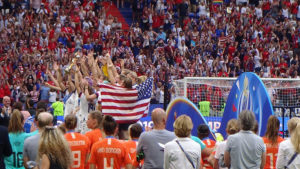US Women’s Soccer Team Are Fighters, and Sometimes the Opponent Is Right Here at Home
 The USWNT receives their medals at the 2019 FIFA Women's World Cup Final (photo by Howard Cheng)
The USWNT receives their medals at the 2019 FIFA Women's World Cup Final (photo by Howard Cheng) On the heels of their record-setting fourth World Cup victory on July 7 in France, the US women’s national soccer team (USWNT) is engaged in a lawsuit with the United States Soccer Federation to seek equal pay with the men’s team, members of which recently disputed the USSF’s claim that the women are, in fact, paid more.
At the same time, the World Cup champions are facing pressure from an unlikely adversary—fellow National Women’s Soccer League player Jaelene Hinkle.
The defender for the North Carolina Courage was passed over for national team selection after being cut a few days into training in 2018, and some have speculated the reason is her religion. Hinkle is a devout Christian who, in an interview with The 700 Club, said that being on the national team was tantamount to disobedience to God. Christian author Obianuju Ekeocha tweeted the interview with added commentary: “Apparently, the US women’s football team is not a very welcoming place for Christians.”
In response, goalkeeper Ashlyn Harris (who was on the 2019 World Cup roster), retweeted Hinkle’s interview and wrote, “You weren’t around long enough to know what this team stood for. This is actually an insult to the Christians on our team.”
In fact, several USWNT players hold team prayers and Bible study, including Tobin Heath and Julie Ertz, high-profile members of the starting eleven.
So, if not her faith, what was the explanation for Hinkle being left at home? In the same interview, Hinkle spoke about her decision to decline a 2017 call-up to the team after it was revealed that the jerseys would honor the LGBTQ+ community. “It wasn’t my job to wear this jersey,” Hinkle explained. “And I gave myself three days to seek and pray and determine what God was asking of me.”
Ultimately, she withdrew from the team and has not been selected for the final roster since.
Therein lies the problem with any assessment that Hinkle’s religion barred her from national team selection: to win a World Cup, which the USWNT knows how to do better than anyone, the team needs unity. On a team where nearly half of the roster is openly gay, including co-captain Megan Rapinoe and head coach Jill Ellis, that unity cannot exist when a member holds beliefs that are explicitly antithetical to group values.
Even though the traditional sports argument of “if someone is that good, they should be on the team,” is a fine take, the USWNT has time and time again proven that they are about more than soccer.
In addition their lawsuit against the USSF, some players on the women’s national team have started to call on FIFA (the international governing body of football) to address the pay gap issue in women’s soccer in general, not just in the United States. Importantly, the women are now four-time world champions, while the men’s best finish is third place, all the way back in 1930. Since their last World Cup win, the women have brought in more revenue for the organization than the men by millions, and yet the pay gap still exists.
This year, Rapinoe, already famous for being one of the first (and only) white athletes to kneel in solidarity with Colin Kaepernick, became a household name when she prematurely said she wouldn’t be going to the White House after the World Cup. President Trump issued a challenge of his own: win first, then talk.
She won, and the team stood behind her, including defender Ali Krieger (who, incidentally, is engaged to teammate Ashlyn Harris).
“In regards to the ‘President’s’ tweet today, I know women who you cannot control or grope anger you,” Krieger tweeted. “But I stand with @mPinoe & will sit this one out as well. I don’t support the administration nor their fight against LBGTQ+ citizens, immigrants & our most vulnerable.”
The team subsequently accepted invitations from Representatives Alexandria Ocasio-Cortez (D-NY), Ayanna Pressley (D-MA), and Senator Kamala Harris (D-CA), to visit the House of Representatives and the Senate later this summer (after the team’s official victory tour).
To much of the country, whether for good or ill, this team has come to mean something more than muddy fields and gold medals, and the World Cup win was about much more than a trophy. The players have burst into pop culture in the last few years, loudly, brazenly, and unapologetically. This summer, in the face of immense pressure, they beat the French national team on their home turf. They beat England a day before the Fourth of July. They took home their fourth World Cup (and their second in a row) in the midst of a feud with the President of the United States. And they did all of it together, as a team, fighting for equality.
It wasn’t Jaelene Hinkle’s Christianity that kept her home. Perhaps it was the intolerance that the USWNT is famous for fighting against. Or it was the insult to Christian members on the roster when she used her religion as an excuse for that intolerance.
Most likely, the deciding factor was the inclusion of Crystal Dunn on the roster. Dunn is simply a better skilled player in her position, who wowed in every match she played.
